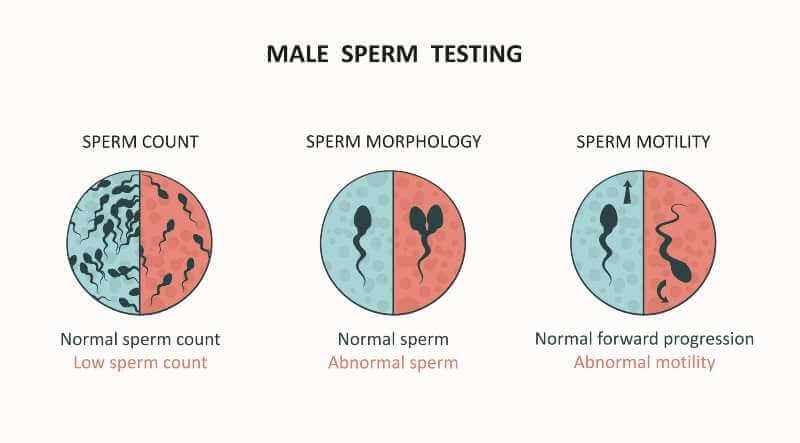Men resort to doing a semen analysis mainly for infertility issues sometimes for erectile dysfunction or other sexual concerns. A semen analysis is one of the first tests performed in men to diagnose reasons for infertility in couples. It evaluates the quality of the seminal fluid by looking at the spermatozoa (sperm cells) in numbers per ml, sperm motility (movement) and its morphology (shape of sperm cells).
What is a semen analysis?
Semen is the fluid that is ejected through the male penis during ejaculation (sexual climax)
Semen contains spermatozoa (sperm cells) produced in the testes and water, plasma and mucous. produced in the prostate. The function of semen is to carry spermatozoa from the male body until it reaches the oocyte (egg) in the female fallopian tubes.
Semen analysis results
A semen analysis is the evaluation of sperm under a microscope. It will be evaluated according to;
- Number of spermatozoa per ml (according to the World Health Organization “WHO “this should be above 15 million)
- Motility (movement) of the spermatozoa and the way of movement.
- Morphology the way the sperm looks
Furthermore, the semen analysis will also evaluate, amount in ml, color, viscosity and odor of the semen sample.
The main reason for your doctor to request a semen analysis is delayed fertility but also to evaluate if medication, a varicocelectomy or vasectomy have been successful.
Test results of a semen analysis usually come out after 24 hours but there are laboratories that do this faster.
How to read a sperm analysis report?
semen analysis results;

Sample volume
Average normal sample volume ranges from 2 to 5 ml.
Liquefaction time
It is the time taken for semen to become liquefied. Just ejaculated semen is a gel like substance, and it takes 20-30 minutes to get a liquid like structure. An infection of the testicle may prolong the liquefication time.
Counting sperm cells
Healthy sperm according to the WHO should contain at least 15 million spermatozoa per ml. Low sperm count can indicate a production problem. This can be done due to a hormonal problem or as a result of infection/inflammation of the testicles.
Having oligospermia (a low sperm count) does not mean that a man cannot have children, but it may explain the delay or difficulty conceiving.
Sperm Motility
Sperm is considered to have a good motility when total motility is at least 40-81% and progressive motility is 32-75%.
The role of shape and size of spermatozoa
Morphology includes the shape and size of spermatozoa. The higher the proportion of abnormal sperm, the lower the chance of fertilization. Abnormal shapes include head, neck and tail abnormalities as well as immature spermatozoa. Sperm has a normal morphology when at least 3 percent or more of the spermatozoa are of normal shape and size. Spermatozoa that have an abnormal shape or are immature number of white blood cells will have difficulty fertilizing an egg and may cause a delay in conceiving or infertility.
Spermatozoa’s morphology could be affected by chemical infection, exposure to radiation, infection or testicular inflammation.
PH level
The PH level is healthy when it is between 7.2-8. Excessive low or high acidity can lead to sperm cell death or impaired movement.
Number of white blood cells
Semen is healthy if there are no white blood cells or bacteria in the sample. The appearance of white blood cells or bacteria indicates inflammation or infection of the testicles.
If the results of a semen analysis are abnormal, the couple should visit a doctor who might require a hormonal profile test to be done, prescribe supplements and of course take a thorough medical history to try to determine if this semen analysis result was influenced by transient factors or if there is a fundamental problem.
Some advice from our doctors at Bedaya Hospital
Our doctors would like to give some advice on how to keep yourself and sperms healthy!
- Maintain a healthy Body Mass Index (BMI)!! Being overweight or obese negatively affects your sperm production!
- There are supplements that can improve semen quality but only take these after consulting with your doctor.
- Avoid excessive drinking or drug abuse
- Avoid wearing clothes that are too snug in the crotch area and always wear breathable cotton underwear.






